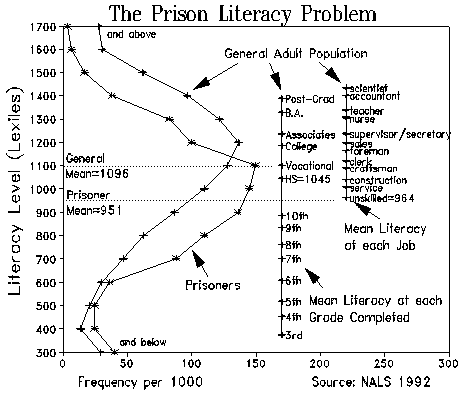
"The U.S. prison population has tripled since 1980 to a record 1.5 million. Another 3.5 million are on probation or parole. If this trend continues, the number of Americans under the control of the criminal justice system, including those in prison and on parole, will approach the number of full-time students enrolled in four-year colleges and universities. It is alarming that two- thirds don't have the literacy skills needed to function in society. An increasing number of states are reducing their support for education programs for prisoners. `With so many of our young adults incarcerated, are we comfortable with their overall low levels of literacy? Most all will be released back into society. Should we let them remain so unprepared for employment and social responsibility?' stated Richard Coley." (From ETS Developments 41:2, 1995-96, p.8).

The 1992 National Adult Literacy Survey gives insight into the abysmal literacy of prisoners. Using sophisticated sampling techniques, the survey measured the literacy level of 1,103 prisoners and 23,617 adult members of the general population with a test of 184 literacy items.
Rasch analysis of the NALS data was conducted in two phases. First, the general adult population were measured and item calibrations obtained. By inspection, 1 logit = 180 lexiles with a mean test difficulty of 916 lexiles. The mean adult literacy measure on this scale was 1,096 lexiles. Adult means by occupation and education completed were also obtained. Second, the items were anchored at their general calibrations and the prisoners were measured. The mean prisoner literacy measure was 951 lexiles, 145 lexiles less than the adult mean.
The results are in the Figure. Prisoner mean literacy is lower than the mean of any occupational group. One third of the prisoners read at less than a 9th grade level. This places prisoners at a disadvantage additional to their criminal history. They cannot compete in the work-place. If prison is to be a place of correction and rehabilitation, then prisoners must acquire the skills needed to give them, on release, a reasonable chance to become productive members of society. Vigorous prison literacy programs are essential.
Prison literacy problem. Linacre JM. … Rasch Measurement Transactions, 1996, 10:1 p.473
| Forum | Rasch Measurement Forum to discuss any Rasch-related topic |
Go to Top of Page
Go to index of all Rasch Measurement Transactions
AERA members: Join the Rasch Measurement SIG and receive the printed version of RMT
Some back issues of RMT are available as bound volumes
Subscribe to Journal of Applied Measurement
Go to Institute for Objective Measurement Home Page. The Rasch Measurement SIG (AERA) thanks the Institute for Objective Measurement for inviting the publication of Rasch Measurement Transactions on the Institute's website, www.rasch.org.
| Coming Rasch-related Events | |
|---|---|
| Jan. 16 - Feb. 13, 2025, Fri.-Fri. | On-line workshop: Rasch Measurement - Core Topics (E. Smith, Winsteps), www.statistics.com |
| Apr. 8 - Apr. 11, 2026, Wed.-Sat. | National Council for Measurement in Education - Los Angeles, CA, ncme.org/events/2026-annual-meeting |
| Apr. 8 - Apr. 12, 2026, Wed.-Sun. | American Educational Research Association - Los Angeles, CA, www.aera.net/AERA2026 |
| May. 15 - June 12, 2026, Fri.-Fri. | On-line workshop: Rasch Measurement - Core Topics (E. Smith, Winsteps), www.statistics.com |
| June 19 - July 25, 2026, Fri.-Sat. | On-line workshop: Rasch Measurement - Further Topics (E. Smith, Winsteps), www.statistics.com |
The URL of this page is www.rasch.org/rmt/rmt101a.htm
Website: www.rasch.org/rmt/contents.htm